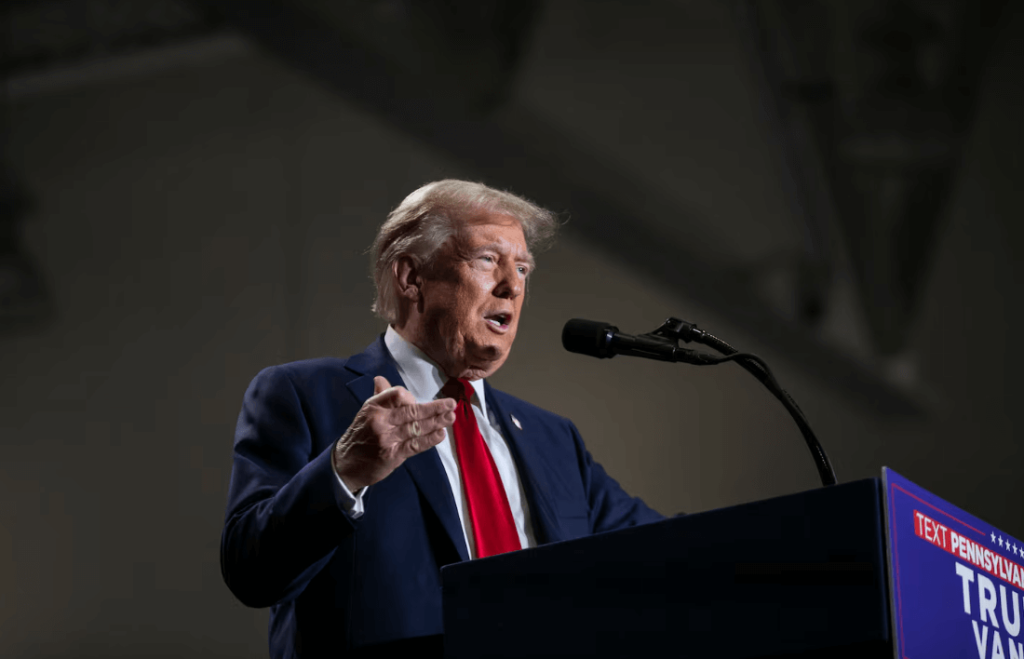【中美创新时报2024 年 9 月 30 日编译讯】(记者温友平编译)共和党人在 11 月大选前发起了一系列诉讼,挑战投票规则和做法,为选举日后可能出现的规模更大、更具争议性的白宫法律战奠定了基础。《纽约时报》记者丹尼·哈基姆、亚历山德拉·伯宗和尼克·科拉萨尼蒂(Danny Hakim, Alexandra Berzon and Nick Corasaniti)对此作了下述报道。
诉讼的猛烈攻势,其中大部分是在最近几周发起的,包括共和党团体今年在全国范围内提起的近 90 起诉讼。根据跟踪选举案件的民主党组织 Democracy Docket 的数据,法律推动已经是 2020 年选举日前提起的诉讼数量的三倍多。
投票权专家表示,这场法律运动似乎是为了准备在选举日后对总统选举结果提出异议,以防共和党候选人、前总统唐纳德·特朗普输掉选举,并拒绝像四年前那样接受失败。这些诉讼集中在可能决定选举结果的摇摆州和关键县。其中一些诉讼支持特朗普自 2020 年以来一直宣扬的选民欺诈和所谓的选举舞弊理论。
在该州第三大县宾夕法尼亚州蒙哥马利县,共和党正试图强迫当地官员手工计票,这让人想起了关于投票机被破坏的阴谋论。共和党全国委员会本月在内华达州提起的一起案件错误地声称 2020 年该州有近 4,000 名非公民投票,这一说法当时遭到了该州最高选举官员、一名共和党人的否认。
如果成功,共和党的诉讼将使选民人数减少,主要是通过取消更有可能是民主党人的选民的资格。他们寻求清除选民名册,挑战拜登总统旨在扩大投票渠道的行政命令,并对邮寄投票制定更严格的要求。
包括一些共和党人在内的选举专家表示,绝大多数案件注定会失败,要么是因为提交得太晚,要么是因为它们基于毫无根据或完全虚假的指控。
案件的数量和最后一刻的时间,以及党内官员和特朗普盟友的声明,表明这项努力背后有一个更广泛的目标:为投票后挑战结果奠定基础。如果特朗普对结果提出异议,诉讼中的指控很可能会重新出现——无论是在法庭上还是在媒体上。
“这些案件中的许多都强化了特定的叙述,特别是关于移民和投票的叙述,”监督选举的无党派组织“保护民主”的律师杰西卡·马斯登说。 “以诉讼的形式提出虚假指控是一种净化和增加合法性的方式。”
参与的共和党律师表示,他们的工作旨在为选举创造更多信心。
“我们的法律努力正在努力解决系统中的问题,追究选举官员的责任,保护选举保障措施,捍卫法律,”负责共和党全国委员会和特朗普竞选团队选举诚信行动的吉宁·布雷索在一份声明中表示。“虽然民主党人想要一个没有保障措施、容易出现欺诈行为、计算非法选票的系统,但我们致力于确保选举安全,保护每一张合法选票。”
共和党全国委员会正在领导一个广泛的保守派法律团体网络参与这项工作。特朗普的盟友,包括他的儿媳拉拉·特朗普,于去年 3 月接管了该委员会,让布雷索负责法律行动,并承诺采取更积极的战略。 2020 年大选后,共和党律师有时拒绝参与唐纳德·特朗普的法律竞选活动,迫使他依赖一群外部人士,他们提起的案件充斥着错误和虚假指控。此后,几名特朗普律师被刑事指控。
其中包括克里斯蒂娜·鲍勃,她现在是共和党全国委员会选举诚信团队的高级法律顾问。鲍勃最近表示,她已经做好了选举日后更多诉讼的准备。
“我对此有点屏住呼吸,”她在最近的播客中说。“我认为,至少从诉讼方面来看,我们在选举前可能处于最好的状态。”
民主党人也表示他们已经做好了准备。副总统卡马拉·哈里斯的竞选团队表示,他们拥有一支由数百名律师和数千名志愿者组成的法律团队。他们防守多于进攻,但也选择了一些关键的干预地点。该竞选团队最近在佐治亚州对州选举委员会提起诉讼,原因是该委员会让其成员更容易拒绝认证选举结果。
“我们正在进行比以往任何时候都多的防御性干预,”为哈里斯竞选团队工作的民主党主要选举律师马克·埃利亚斯在接受采访时表示。“我坚信,你不会允许共和党人提起没有回应的严重诉讼。”
扩大法律努力代表了共和党全国委员会的战略赌博。该党通常将大部分精力花在争取选民上——资助敲门、运营电话银行和追踪选民的广泛组织活动。今年,共和党和特朗普竞选团队已将这些努力大部分外包给盟友组织,并将资源重新用于诉讼和其他所谓的选举诚信努力。
许多领导人都是该党法律团队的新成员。
然而,布雷索曾担任共和党选举律师。她曾在联邦选举援助委员会任职,并曾与共和党选举律师事务所 Holtzman Vogel 合作过一段时间。她很少公开谈论特朗普关于 2020 年大选的虚假指控,尽管她的观点似乎已经发生了变化。
在疫情初期,她与他人合写了一篇评论文章,认为需要给予州和地方政府“灵活性”来适应危机,扩大邮寄投票渠道“可能是解决方案的一部分”,尽管“不是万能药”。
这种观点很快遭到了与特朗普结盟的共和党人的拒绝,他们认为邮寄投票的激增是企图窃取选举结果。2020 年大选后,布雷索将“我们目前的这种局面”归咎于新冠疫情时代对投票程序的改变。
此后,布雷索多次参加选举诚信网络的会议,该网络是一个由宣传或相信投票阴谋论的活动家组成的领先团体。在 2022 年的一次小组讨论中,她敦促与会者“走出去,成为一名投票工作人员”,并补充说,“我们需要关注这个过程。”
在她的指导下,共和党全国委员会提起了几起诉讼,要求限制邮寄投票,包括宾夕法尼亚州、内华达州、密歇根州和北卡罗来纳州的诉讼。
该委员会还试图将选民从名单中除名,并根据虚假指控提起了几起最近的案件,这些指控称民主党正在让大量没有合法身份的移民投票。一些案件已经被驳回。
“民主党继续把非公民放在第一位,把美国人放在最后,因为他们允许非公民投票,”共和党全国委员会主席迈克尔·沃特利在最近宣布内华达州诉讼的新闻稿中说。
对起诉和州选民数据的研究表明,非公民投票的情况非常罕见。
“他们在法庭上唯一需要的就是证据,”特朗普政府前白宫律师泰·科布 (Ty Cobb) 表示,他对旧谎言的复活感到惋惜。“上次他们没有证据,这次也不太可能有。”
本文最初发表于《纽约时报》。
题图:前总统唐纳德·特朗普。MADDIE MCGARVEY/NYT
附原英文报道:
Trump allies bombard the courts, setting stage for post-election fight
By Danny Hakim, Alexandra Berzon and Nick Corasaniti New York Times,Updated September 29, 2024
Former president Donald Trump.MADDIE MCGARVEY/NYT
Republicans have unleashed a flurry of lawsuits challenging voting rules and practices ahead of the November elections, setting the stage for what could be a far larger and more contentious legal battle over the White House after Election Day.
The onslaught of litigation, much of it landing in recent weeks, includes nearly 90 lawsuits filed across the country by Republican groups this year. The legal push is already more than three times the number of lawsuits filed before Election Day in 2020, according to Democracy Docket, a Democratically aligned group that tracks election cases.
Voting rights experts say the legal campaign appears to be an effort to prepare to contest the results of the presidential election after Election Day should former president Donald Trump, the Republican nominee, lose and refuse to accept his defeat as he did four years ago. The lawsuits are concentrated in swing states — and key counties — that are likely to determine the race. Several embrace debunked theories about voter fraud and so-called stolen elections that Trump has promoted since 2020.
In Montgomery County, Pa., the state’s third-largest county, the party is seeking to force local officials to count ballots by hand, evoking debunked conspiracy theories about corrupted voting machines. A case filed by the Republican National Committee in Nevada this month falsely asserts that nearly 4,000 noncitizens voted in the state in 2020, a claim that was rejected at the time by the state’s top election official, a Republican.
If successful, the Republicans’ lawsuits would shrink the electorate, largely by disqualifying voters more likely to be Democrats. They seek purges of voter rolls, challenge executive orders from President Biden aimed at expanding ballot access and create stricter requirements to voting by mail.
Election experts, including some Republicans, say a vast majority of the cases are destined to fail, either because they were filed too late or because they are based on unfounded, or outright false, claims.
The volume and last minute timing of the cases, along with statements from party officials and Trump allies, suggest a broader aim behind the effort: Laying the groundwork to challenge results after the vote. The claims in the lawsuits may well be revived — either in court or in the media — if Trump contests the outcome.
“Many of these cases reinforce particular narratives, particularly those about immigrants and voting,” said Jessica Marsden, a lawyer at Protect Democracy, a nonpartisan group that monitors elections. “Putting false claims in the form of a lawsuit is a way to sanitize and add legitimacy.”
Republican lawyers involved said their work was aimed at creating more confidence in elections.
“Our legal efforts are fighting to fix the problems in the system, hold election officials accountable, protect election safeguards, and defend the law,” said Gineen Bresso, who is running the election integrity operation for the Republican National Committee and the Trump campaign, in a statement. “While Democrats want a system open to fraud without safeguards, that counts illegal votes, we are committed to securing the election so every legal vote is protected.”
The RNC is leading a broad network of conservative legal groups in the effort. Trump’s allies, including his daughter-in-law, Lara Trump, took over the committee last March, placing Bresso in charge of the legal operation and promising a more aggressive strategy. After the 2020 election, the party’s lawyers had at times refused to participate in Donald Trump’s legal campaign, forcing him to rely on a collection of outsiders who filed cases rife with errors and false claims. Several Trump lawyers have since been criminally charged.
Among them is Christina Bobb, who is now senior counsel on the RNC’s election integrity team. Bobb recently suggested that she was braced for more litigation after Election Day.
“I’m kind of holding my breath for that,” she said on a recent podcast. “I think we’re in probably, at least litigation-wise, as good of a place as we can be before the election.”
Democrats, too, say they are prepared. Vice President Kamala Harris’s campaign says it has a legal team of hundreds of lawyers and thousands of volunteers. They have played more defense than offense, but have picked some key places to intervene. The campaign recently filed a lawsuit in Georgia against the state Election Board after it made refusing to certify results easier for its members.
“We’re doing more defensive interventions than we’ve ever done before,” said Marc Elias, a leading Democratic election lawyer working for the Harris campaign, in an interview. “I am a big believer that you do not allow the Republicans to bring serious litigation that goes unresponded to.”
The expanded legal effort represents a strategic gamble for the RNC. The party has typically spent much of its energy on turning out voters — funding extensive organizing operations that knock on doors, run phone banks, and track voters. This year, the Republicans and the Trump campaign have largely outsourced those efforts to allied organizations and redirected resources to litigation and other so-called election integrity efforts.
Many of the leaders are new to the party’s legal team.
Bresso, however, has a history as an establishment Republican election lawyer. She served on the federal Election Assistance Commission and was for a time associated with a GOP election law firm, Holtzman Vogel. She has said relatively little publicly about Trump’s false claims about the 2020 election, although it appears her views may have shifted.
In the early days of the pandemic, she co-wrote an opinion piece arguing that state and local governments needed to be given “flexibility” to adjust to the crisis and that expanded access to mail-in votes “might be part of the solution” though it was “no cure all.”
That perspective was soon rejected by Republicans aligned with Trump, who came to see the surge of mail voting as an attempt to steal the election. After the 2020 election, Bresso blamed the COVID-era changes to voting procedures for “this landscape that we have in place right now.”
Since then, Bresso repeatedly participated in meetings of the Election Integrity Network, a leading group of activists who promote or buy into conspiracy theories about voting. During a panel discussion in 2022, she urged those in attendance to “go out and be a poll worker,” adding, “we need to have eyes on the process.”
Under her direction, the RNC has filed several lawsuits seeking to restrict mail voting, including active cases in Pennsylvania, Nevada, Michigan, and North Carolina.
The committee has also sought to remove voters from the rolls, filing several recent cases based on false claims that Democrats are signing up vast numbers of immigrants without legal status to vote. Some have already been dismissed.
“Democrats continue to put noncitizens first and Americans last as they allow noncitizens to vote,” said Michael Whatley, the chair of the RNC, in a recent news release announcing the Nevada lawsuit.
Studies of prosecutions and state voter data have shown it is very rare for noncitizens to cast ballots.
“The one thing they need in court is evidence,” said Ty Cobb, a former White House lawyer under Trump, who bemoaned the revival of old falsehoods. “They didn’t have any last time, and they’re unlikely to have any this time.”
This article originally appeared in The New York Times.

